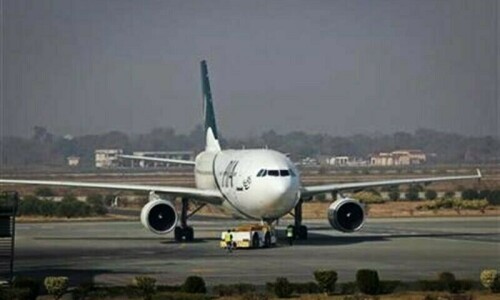 The sub-prime mortgage crisis has had an adverse domino effect on the US economy with ripple effects the world over. The American pride has been hit by the poisoned arrow of the credit crunch, mounting debts lingering on in the books of financial institutions and slowing down in the consumer spending.
The sub-prime mortgage crisis has had an adverse domino effect on the US economy with ripple effects the world over. The American pride has been hit by the poisoned arrow of the credit crunch, mounting debts lingering on in the books of financial institutions and slowing down in the consumer spending.
Financial institutions and their auditors have still to determine the erosion of capital by the gigantic losses that continue to descend on their home loan book The cash-strapped financial system is desperately struggling to fight the menace of the lingering slump in the US economy. The Federal Reserve has slashed the interest rates to a 4.25 per cent from 5.25 per cent following the housing debacle.
The dollar is depreciating against rival currencies. The euro has particularly is emerging as the replacement for the dollar. Representing the single currency of 13 (18 by Jan 2008) promising European countries, itself is a sign of strength of euro. Euro and EU represent an expanding common market and hence the world is looking at it as a huge potential. By January 2008, the payment in euro through SEPA implementation will make the trade in euro more attractive, at least in 27 European counties. The dollar appears to be losing the ground slowly to euro.
The beginning of year 2003 saw $1 for €1, eighteen months ago one euro bought $1.20. Now it’s touching $1.5 and there’s no reason to think that it will stop there. Three of the world’s biggest oil exporters Iran, Russia and Venezuela are now demanding payment in euros instead of dollars.
The Gulf States are debating a switch over to either a managed float or pegging their currencies to a basket of currencies, including the euro, sterling and yen. Kuwait has broken the ranks of its neighbouring countries and started tracking a currency basket.
China is vigilantly studying the repercussions of the sliding dollar value as it has a formidable $1.455 trillion in its foreign exchange reserves. It is suspected that they are shifting their gigantic reserves to alternate currencies. This view is reinforced by the Governor of People’s Bank of China’s alerted stance to companies to explore different avenues apart from the US markets for trading.
India’s Ministry of Culture has announced that foreign tourists can no longer pay in dollars when visiting the legendary Taj Mahal and other heritage sites. Instead they are required to pay in good hard Indian rupees!
Even though most of the world trade, approximately 60 per cent, is denominated in dollars, euro is emerging as a big threat to the greenback. Euro already denominates more than 20 per cent of world trade accounts and this trend is strengthening in favour of the euro.
Currency traders from Egyptian street hawkers to Asian central banks are looking to the euro as a better store of value as the US dollar erodes. Being the world’s currency of choice for central bank reserves, the dollar has long been the de facto second currency in street markets and on tourist menus around the world.
Today, in Russia restaurants and hotels that once listed prices in the dollar rather than the unstable rubble have increasingly pegged prices to euro. Taxi and rent-a-car drivers at Karachi five-star hotels have begun to recognise the power of the euro and make demands of it from the tourists and businessmen, in preference to the dollar.
The share of global official reserves in euro has risen from 17.9pc in 1999 to 25.8pc in 2006 according to the IMF. In the same period, the dollar’s share has fallen from 71pc to 64.8pc. It has been a high growth trajectory considering it is a fairly new currency.
Again, the potential in terms of statistics, is convincing that the euro will be a formidable challenge to the dollar. The 15 EU countries have a population of 370 million, compared to 263 million of USA and 125 million in Japan.
EU is indeed coming up as a great trading region and is increasing its competitiveness and productivity. The implementation of SEPA will further strengthen the euro.















































Dear visitor, the comments section is undergoing an overhaul and will return soon.